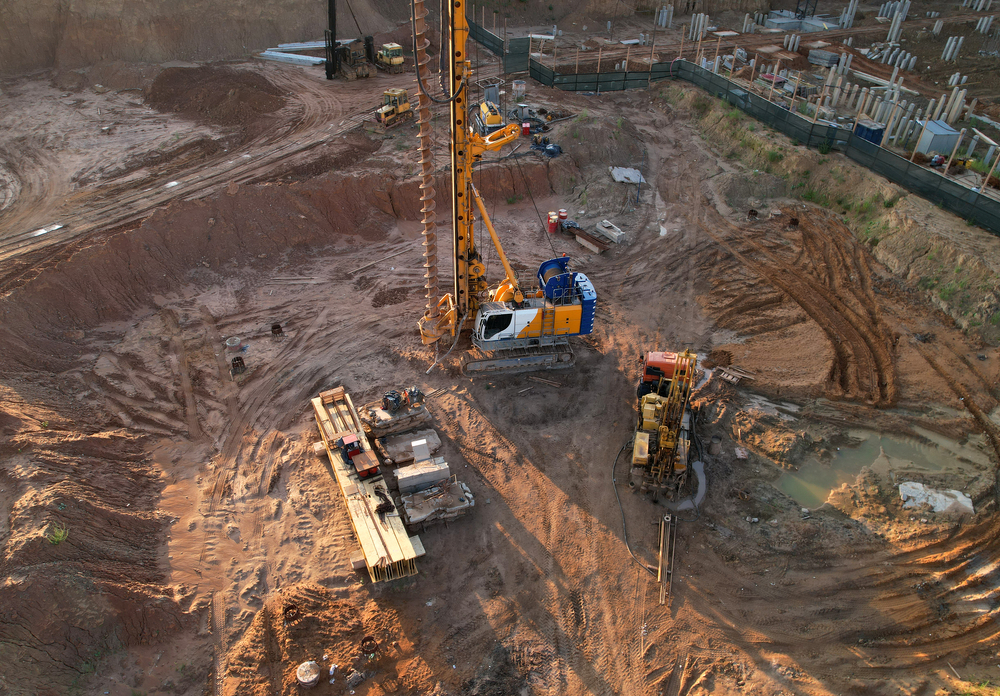The 5-Second Trick For Geotheta
The 5-Second Trick For Geotheta
Blog Article
The Best Strategy To Use For Geotheta
Table of ContentsGetting The Geotheta To WorkTop Guidelines Of GeothetaGetting My Geotheta To WorkThe Main Principles Of Geotheta Rumored Buzz on Geotheta

They carry out site examinations, collect samples, perform research laboratory examinations, and assess data to review the suitability of the ground for construction jobs - Geo Tech Engineering. Based on their findings, geotechnical designers provide recommendations for foundation design, slope stability, retaining frameworks, and reduction of geotechnical hazards. They work together with various other professionals, such as engineers, structural engineers, and building and construction groups, to make sure that geotechnical factors to consider are incorporated right into the general project style and implementation
By examining the habits and residential properties of dirt and rock, they can identify possible geotechnical dangers such as landslides, soil settlement, or slope instability. Their knowledge helps protect against failures or crashes that could jeopardize lives and building. Right here are some detailed duties and duties of a geotechnical designer: Site Examination: Geotechnical engineers conduct site examinations to collect data on subsurface conditions.
They translate the information to recognize the properties and actions of the dirt and rock, including their strength, leaks in the structure, compaction attributes, and groundwater problems. Geotechnical Evaluation and Layout: Geotechnical designers evaluate the data gathered throughout site examinations to evaluate the security and suitability of the website for construction tasks. They do geotechnical calculations and modeling to review aspects such as birthing capacity, settlement, slope stability, lateral planet stress, and groundwater flow.
Some Ideas on Geotheta You Need To Know
Foundation Style: Geotechnical engineers play an important function in creating structures that can safely sustain the intended framework. They evaluate the dirt conditions and lots demands to determine the ideal foundation type, such as superficial structures (e.g., footings), deep structures (e.g (https://geotheta.blog.ss-blog.jp/2024-08-02?1722614750)., heaps), or specialized strategies like dirt improvement. They think about elements such as settlement limitations, bearing capacity, and soil-structure interaction to create ideal foundation designs
They examine construction strategies, display site tasks, and conduct field examinations to validate that the style recommendations are followed. If unpredicted geotechnical problems emerge, they assess the circumstance and offer recommendations for removal or changes to the style. Danger Assessment and Reduction: Geotechnical engineers analyze geotechnical risks and risks related to the project website, such as landslides, liquefaction, or dirt disintegration.

Collaboration and Interaction: Geotechnical engineers work carefully with other experts entailed in a job, such as architects, architectural engineers, and building groups. Reliable interaction and partnership are vital to integrate geotechnical factors to consider right into the overall project style and construction process. Geotechnical designers offer technological proficiency, answer queries, and make certain that geotechnical requirements are fulfilled.
A Biased View of Geotheta
Here are some sorts of geotechnical engineers: Foundation Designer: Foundation engineers specialize in developing and analyzing foundations for frameworks. They assess the soil conditions, load requirements, and site characteristics to figure out one of the most appropriate structure kind and design, such as shallow structures, deep structures, or specialized methods like pile foundations.
They evaluate the elements influencing incline stability, such as dirt buildings, groundwater conditions, and slope geometry, and establish techniques to avoid slope failings and minimize dangers. Quake Designer: Earthquake engineers focus on evaluating and creating structures to stand up to seismic forces. They assess the seismic hazard of a site, review dirt liquefaction possibility, and establish seismic design criteria to ensure the safety and security and durability of frameworks throughout quakes.
They perform area screening, gather samples, and assess the gathered information to define the dirt residential or commercial properties, geologic developments, and groundwater conditions at a site. Geotechnical Instrumentation Designer: Geotechnical instrumentation engineers concentrate on tracking and gauging the behavior of dirt, rock, and frameworks. They set up and keep instrumentation systems that check aspects such as soil settlement, groundwater levels, incline activities, and architectural variations to assess efficiency and provide very early warnings of potential problems.
Not known Facts About Geotheta
They conduct tests such as triaxial tests, debt consolidation tests, straight shear examinations, and permeability tests to gather information for geotechnical analysis discover this info here and design. Geosynthetics Engineer: Geosynthetics designers specialize in the layout and application of geosynthetic products, such as geotextiles, geogrids, and geomembranes. They use these materials to boost soil security, strengthen slopes, give drainage solutions, and control erosion.
They often tend to be investigatory individuals, which indicates they're intellectual, introspective, and curious. They are curious, systematic, rational, analytical, and rational. Several of them are also social, suggesting they're kind, generous, cooperative, client, caring, useful, compassionate, skillful, and friendly. Does this seem like you? Take our free occupation examination to learn if geotechnical designer is one of your leading profession suits.
In the office environment, geotechnical designers use specialized software tools to carry out calculations, develop layouts, and evaluate information. They prepare reports, evaluation project requirements, interact with clients and staff member, and coordinate job tasks. The workplace setting gives a helpful atmosphere for research study, analysis, and cooperation with various other experts involved in the task.
A Biased View of Geotheta
They often go to project sites to carry out website investigations, examine geotechnical conditions, and collect data for analysis. These visits include taking a trip to various places, occasionally in remote or difficult surfaces. Geotechnical engineers might perform dirt tasting, conduct tests, and monitor construction tasks to ensure that the geotechnical aspects of the project are being applied properly.
Geotechnical designers additionally work in specialized geotechnical labs. Geotechnical laboratory designers function extensively in these atmospheres, taking care of screening devices, running tools, and tape-recording data.
Report this page